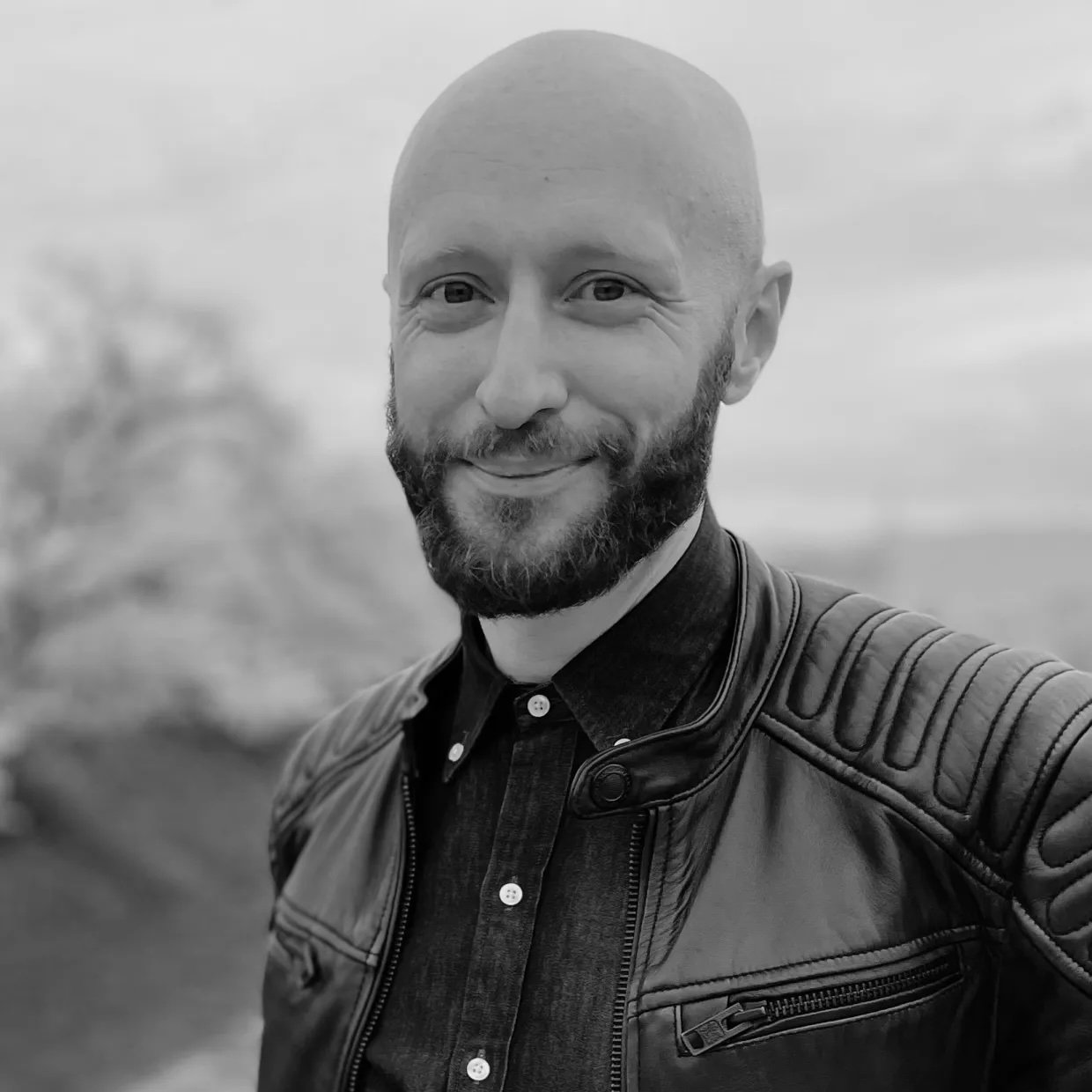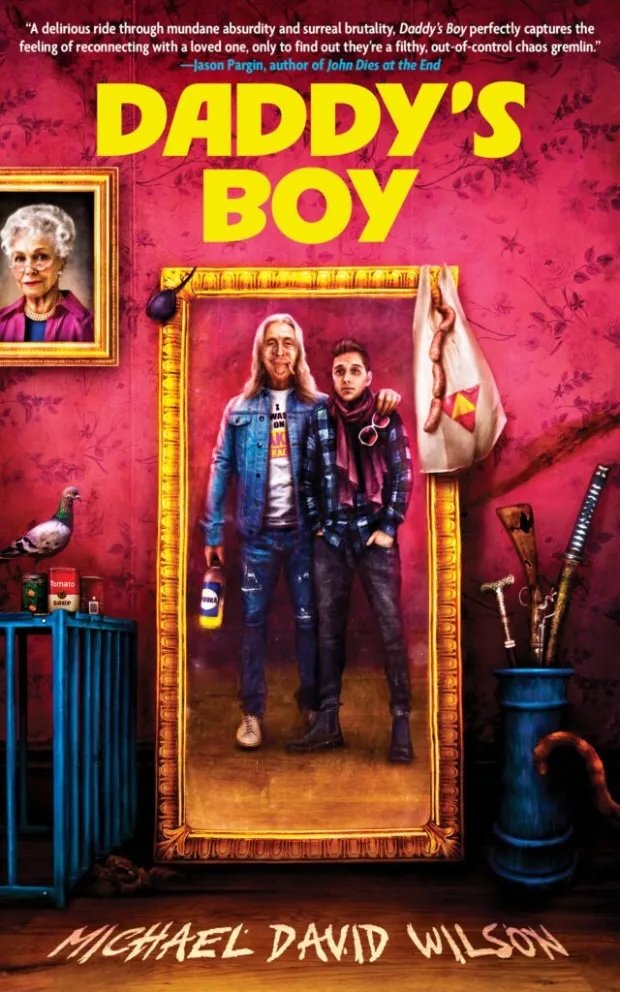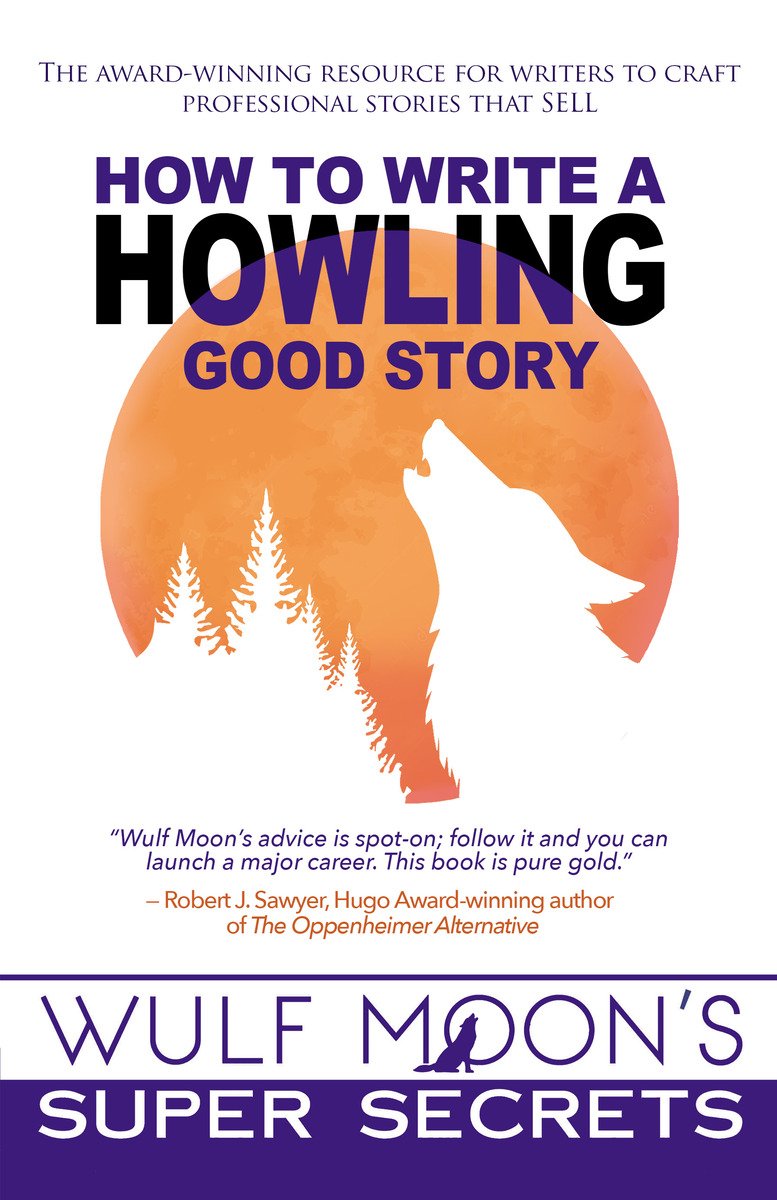Interview with Michael David Wilson | Author of Daddy’s Boy
Check out Michael David Wilson’s new novel, Daddy’s Boy, available now
After reading Daddy’s Boy by Michael David Wilson, you might almost think the author has a soft side—almost. “The book is about relationships and reconnecting with a parent,” the UK-born author said during our video chat, “you know, if you dive deeper beyond the sea of sausages and all the dick jokes.” By now, listeners of Wilson’s podcast This is Horror are familiar with his dry sense of humor: measured, deadpan, and dripping with darkness. They’ll find plenty of that in Daddy’s Boy. The new novel oozes with adult humor and riotous situations, but it’s also packed with the violence and gore that readers of Wilson’s other books—like House of Bad Memories, The Girl in the Video, and They’re Watching (with Bob Pastorella)—have come to expect. Daddy’s Boy is available now. Click here to learn more about Michael David Wilson and here to learn more about This is Horror.
Interview
Describe your work for new readers.
They’re going to read fast-paced dialogue, which is something that’s always been important to me. I take influence from the likes of Quentin Tarantino, Elmore Leonard, and other pulpy crime writers like Jim Thompson. In terms of genre, there’s always some sort of dance between dark fiction/horror and comedy/humor. Each story differs in terms of how much of each of those elements are turned up. My latest, Daddy’s Boy, is me operating in a more comedic mode. I’d describe it as a dark comedy with thriller elements, whereas the book before it, House of Bad Memories, is a dark thriller with comedic moments.
What’s your approach to humor in horror?
I’ve never been able to write a straight horror book without throwing in some jokes. Equally I’ve never been able to write a straight comedy without things getting messed up. It puts me in an interesting place when it comes to selling the work. It can have this unfortunate effect where, for the true horror fans, it can be a little too silly or funny at times, whereas the true comedy fans might think, “well, this is really messed up. Why did he do that?” But the people who really connect and resonate with it, now they are true fans. I think as writers that’s what we’re looking for—people who really resonate with our work
What’s the inspiration for Daddy’s Boy?
Goodness, there are so many layers to that question. I composed it when I was going through the worst time of my life. I was going through a divorce and a custody battle and I was not in a good place. But I have to say, writing Daddy’s Boy was the most fun I’ve had writing anything. It was so cathartic. If you dive deeper into Daddy’s Boy, beyond the sea of sausages and all the dick jokes, it’s about parental relationships, about reconnecting with parents. It’s about the limits you will and won’t go through for your family, what your cutoff points are, what you will tolerate. There’s also a lot in there about suicide, about being at your wit’s end. We’ve also got reference to a custody battle, but the custody battle is about a cat. Chuck Palahniuk talks about fiction being dangerous writing, where you get to talk about the things you can’t talk about. So, here I am actually talking about real emotions but it ends up seeming ridiculous, because Wentworth is fighting for a cat, so you can get away with it. You can be more honest through fiction than if you were just giving a true account of your life.
How much of you is in your protagonist, Wentworth?
I think in every character I write, there’s a part of me. I think every character that someone writes has to contain a part of the writer, even if it’s just the way they view other people. It’s a difficult question because I haven’t stopped to quantify it. He’s slightly younger than me but also goes through a lot of the emotions and things I’ve been through, only couched in metaphor. Some of the decisions he makes are a little different—he can be a little more passive. But I think at the heart of it, there is some of me in Wentworth.
There’s also some of me in Norman. I’m more Wentworth than Norman, let’s say. But the parts where Norman is vulnerable and honest and he talks about his feelings as a father, where he talks about perceived failures, a lot of that comes from the heart. Luckily I didn’t do a lot of the things that Norman does, like ‘getting rid of’ the bully that was messing with his son. But the constant feeling that you can never do enough for your child—or that you will disappoint them, or that you have really good intentions, but it goes terribly wrong—is real. I think the stuff with Wentworth with him feeling absolutely hopeless is real. I wouldn’t do some of the things Wentworth does, I’m far more sensible than that.
Daddy’s Boy is available now in paperback, eBook, and audiobook.
In what ways has your work on This is Horror enriched your writing?
It’s been integral in many ways because if I think about when I started This is Horror, I would write in a half-arsed way. I was one of those people who would say, ‘I’ll just write when I have time.’ Well, there’s no such thing. You have to make time. So, it’s been invaluable. There are other things, like the connections I’ve made, I can’t even answer what are all the benefits because there are far too many to list.
What’s the most valuable writing advice you’ve ever heard?
I've been fortunate enough to hear so many valuable pieces of writing advice over the years, but perhaps the most important is as simple as: finish your stories. You can’t do much with a technically perfect first act of a novel, but you can shape up, polish, and improve a complete first draft. There may be obstacles, there may be doubt, there may be all manner of excuses and so-called reasons not to finish your stories, but you must finish them in spite of the noise.
Recently, I read Henry Miller's 'Eleven Commandments' for writing. His first commandment is incredibly valuable, 'Work on one thing at a time until finished'. I would modify it and give you permission to work on 'one thing of one kind' until finished. This modification would allow you to have a fiction and nonfiction project on the go at once. It would allow you to work on a piece of fiction and run a podcast. But don't overdo it. As I often say, ‘you can do anything you want, but you can't do everything you want.’ So, choose wisely.
Silly question time. Let’s play “Fuck, Marry, or Kill” with horror icons—Pinhead, the Alien Queen, and the Blob. Go!
Let’s just choose one of them at random and do all three. Fuck them, marry them, and kill them. In that order. That's a Shakespearean tragedy right there or the darkest of rom coms. And if you like that kind of dark, messed-up humor, you’ll likely enjoy my new novel, Daddy’s Boy, available now in paperback, eBook, and audiobook.
Read more interviews with horror authors here.
Related content




